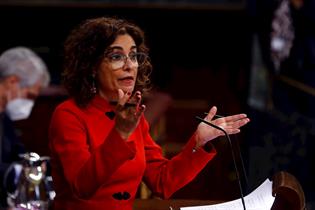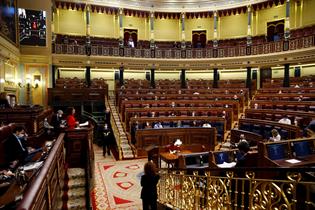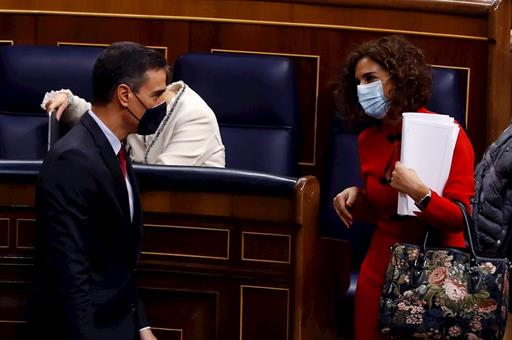National Budget 2021
Treasury Minister announces VAT reduction for face masks from 21% to 4%
News - 2020.11.11
The Minister for the Treasury, María Jesús Montero, announced a VAT reduction for face masks to 4% during the Plenary Debate on the National Budget for 2021.
María Jesús Montero said that the Government of Spain is adopting this decision after having obtained written confirmation from the European Commission that it will not launch an infringement procedure for applying a legal change that contravenes the EU VAT Directive.
The State Secretariat of the Treasury sent a letter to the Directorate-General for Taxation and Customs Union of the European Commission last Friday to ask whether current EU regulations allow for a reduction to the VAT applied to retail sales of face masks.
The European Commission replied on Tuesday afternoon to confirm that, as stated by the Spanish Ministry of the Treasury, the EU Directive prevents the application of reduced rates to face masks sold to the public. However, and given the extraordinary situation, it also states that it will not launch a penalty procedure on Spain for lowering VAT on face masks.
In fact, the European Commission states in its letter that the application of reduced rates or exemptions on goods to combat COVID-19 would indeed be possible if the reform proposal issued by the European Commission in 2018 on reduced rates of VAT had been successful. In this regard, the German Presidency will resume this initiative and states that it hopes to receive support from Spain. The topic will be discussed at a meeting on Wednesday.
In her speech to the Lower House of Parliament, María Jesús Montero said that duty required the Government of Spain to refrain from applying a measure that would contravene EU regulations without obtaining guarantees that Spain would not be penalised for doing so.
Furthermore, the European Commission is working on a draft modification to the VAT Directive so that the vaccines and detection tests can also enjoy reduced rates. Although the Spanish Treasury also proposed including face masks in its letter last Friday, the European Commission considers such action difficult because it does not have consent, adding that face masks are not exclusively used to combat COVID-19.
Price reduction
The Inter-ministerial Medicine Price Committee (Spanish acronym: CIPM) will also discuss a maximum price reduction for surgical face masks in its agenda on Thursday.
The Government of Spain was one of the first countries in the European Union to regulate the price of face masks to avoid speculation and help ensure affordable prices for the whole population. The VAT reduction from 21% to 4% and the maximum recommended retail price reduction are two measures that will save money for households and facilitate access to these products.
Regarding tax issues, the Ministry of the Treasury has been working since the start of the pandemic to facilitate access and lower the cost of healthcare products used for combating or protecting against COVID-19.
Hence, Royal Decree-Law 15/2020, of 21 April, on urgent complementary measures to support the economy and employment, established the application of a 0% tax rate until 31 July 2020 for domestic deliveries, imports and intra-community procurement of healthcare material for combating the pandemic when received by hospital centres, the public authorities or non-profit organisations. For example, 0% VAT is applied to face masks, disinfectant gels and other personal protective equipment.
The Spanish Treasury extended this measure in September until 31 October and María Jesús Montero has said that it will be extended again retroactively until April next year.
Unprecedented mobilisation of resources
 EfeThe minister stressed in her speech that, since the start of the pandemic, the Government of Spain has adopted a raft of measures to mitigate the impact of the crisis on families and households, as well as the productive fabric. Up to 216 billion euros have been mobilised to that end, an unprecedented figure representing approximately 20% of GDP. These resources have enabled the creation of an extensive safety net aimed at making sure nobody is left behind.
EfeThe minister stressed in her speech that, since the start of the pandemic, the Government of Spain has adopted a raft of measures to mitigate the impact of the crisis on families and households, as well as the productive fabric. Up to 216 billion euros have been mobilised to that end, an unprecedented figure representing approximately 20% of GDP. These resources have enabled the creation of an extensive safety net aimed at making sure nobody is left behind.
Specifically, the Government of Spain has protected the incomes and jobs of more than three million people under its furlough schemes, as well as 1.4 million self-employed workers under the benefit for trading suspension. In fact, at the peak of the crisis, one-third of the labour force was receiving some form of protection and half a million companies have been saved.
Furthermore, measures have been put in place to guarantee company liquidity via a line of credit from the ICO [Official Credit Institute] worth 100 billion euros, of which 98% has been allocated to SMEs and the self-employed. Another line of credit worth 40 billion euros is also available to foster investment. The Government of Spain also adopted a series of measures worth almost one billion euros to alleviate fiscal burdens and contributions from companies and the self-employed.
The Government of Spain has also guaranteed resources for the regional government authorities to combat the pandemic by creating a COVID Fund worth 16 billion euros, which represents the largest transfer from the State to the regional governments outside the standard financing system. The regional governments do not need to repay these resources and they are distributed according to the impact from the pandemic on health, education and regional government revenue.
Defending the National Budget for 2021
During the debate on the amendments as a whole for the Draft National Budget for 2021 in the Lower House of Parliament earlier today, the Minister for the Treasury, María Jesús Montero, defended this "country-focused" budget as essential for emerging from the social and economic crisis caused by the pandemic.
She therefore called on all political groups present in the House to be responsible and support a budget that she highlighted as a transformative country-focused, not government-focused, budget capable of benefiting all citizens. "Supporting this budget does not mean siding with the Government of Spain or giving it a blank cheque but rather setting our differences aside in order to focus on what is important and urgent, which is our recovery from this crisis", she said.
The Minister for the Treasury stressed that this budget, approved on 27 October at the Council of Ministers, seeks to provide "certainty, confidence and hope" in response to the crisis in order to come out the other side with "more solid, fair and sustainable" foundations for growth. She underlined its dual objective: to make progress on modernising the productive system while also building more social cohesion and combating inequalities by strengthening the Welfare State.
In her speech to the Lower House, the minister invited the political groups to practise "serious politics, useful politics" capable of solving people's problems. She therefore called on an agreement to approve this budget and said she is open to studying any amendments presented by the political groups aimed at improving the text as it passes through Parliament.
She insisted on the "anomaly" of having a National Budget extended since 2018 that "does not help this country's recovery", which is why she asked to pass a new budget "capable of providing the extraordinary response required by extraordinary circumstances".
María Jesús Montero rejected the policy of vetoes from all sides and the disqualification of initiatives "based on who they come from rather than their content", regarding which she appealed for dialogue and responsibility from political groups aimed at reaching agreements of a beneficial nature for all citizens.
Supporting grounds
 EfeThe Minister for the Treasury underlined a series of reasons why this budget should be supported. On the one hand, it should be a "lever for social and economic transformation" in the country, with a commitment to digitalisation, the ecological transition and gender equality.
EfeThe Minister for the Treasury underlined a series of reasons why this budget should be supported. On the one hand, it should be a "lever for social and economic transformation" in the country, with a commitment to digitalisation, the ecological transition and gender equality.
On the other, she said that this National Budget is also a "shock" for strengthening the Welfare State and equal opportunities and constitutes a safety net for the middle and working classes of the country by redistributing wealth.
She also highlighted the importance of this budget as an instrument for channelling European funds and said that this National Budget represents the basis for "a new social contract" aimed at closing inequality, inter-generational and territorial divides. The minister went on to say that it is a budget for offering hope to young people and protection to older generations.
None of this ignores the commitment to budget stability, which can be seen in this budget through the deficit reduction in 2021 to 7.7%. This would mean a reduction of 3.6 points, one of the largest reductions on record. That commitment can also be seen through the suspension of tax rules in 2020 and 2021, which does not equate to a suspension of fiscal responsibility given that public treasury sustainability is "imperative".
Largest social spending in history
María Jesús Montero broadly outlined the Budget for 2021. It will apply fiscal adjustments aimed at a gradual recovery, support SMEs in their internationalisation processes, induce healthy habits and adapt to the 21st Century reality in order to ensure the fiscal system can be "more progressive, fairer, more environment-focused, more modern and more in line with European standards".
María Jesús Montero stressed that this government seeks fiscal reform to recover the progressiveness lost during previous legislatures and to bring Spain closer to the European average in terms of tax revenue per GDP. Nonetheless, this measure must keep in step with the economic situation, so the reform will take place over the course of this legislature.
In spending terms, the minister underlined the expansive nature of this budget and the largest social spending in history - 239.77 billion euros. This is an increase of 10% and includes 8.99 billion from European funds. Excluding those funds, social spending is also up by 6%.
Hence, this National Budget includes "the most resources ever allocated to public health, long-term care, pensions, study grants and the fight against child poverty".
María Jesús Montero highlighted the increase in social investment "because it forms part of the DNA of this progressist government and because of the European resources aimed at social cohesion". She also responded to those who accuse her of squandering by quoting the international bodies that consider this is the time to spend "in order to boost the economy and not repeat the mistake of the financial crisis".
She highlighted certain headings that further strengthen the Welfare State while also serving as a lever for transformation aimed at laying the groundwork for a productive model for the next few decades.
In her speech, she listed headings allocated to health, education, social services and long-term care, employment, culture, industry and energy, SMEs and trade, tourism, the self-employed, a commitment to R&D+i, digitalisation and infrastructures.
Importance of European funding
The minister highlighted the importance of resources made available by the European institutions to tackle the socio-economic and health impact from the pandemic. 140 billion euros have been allocated to Spain, including transfers and loans from the Recovery and Resilience Mechanism, of which 26.63 billion euros fall under the Budget subject to debate.
María Jesús Montero said that, of the more than 26 billion euros, around half will be transferred to the regional authorities. 1.49 billion euros will be given to local authorities and 10.79 billion euros to regional governments, to which must be added another 8 billion euros from REACT-EU, which do not appear in the National Budget because they directly fall under regional powers. This clearly reflects the commitment from this government to the regional authorities and its concept of State of autonomous regions and institutional collaboration.
In short, the Minister for the Treasury stressed that this is "an extraordinary budget" in which "all groups in society will see themselves reflected". For that reason, she called on all political groups to stand up to the task and again asked for their support in approving this Budget as it constitutes the "lever" for undertaking the structural and necessary changes in this country. "It is not a question of returning to where we were before the crisis but rather of improving and overcoming the previous situation and promoting the structural changes that Spain needs", she said.
Non official translation





